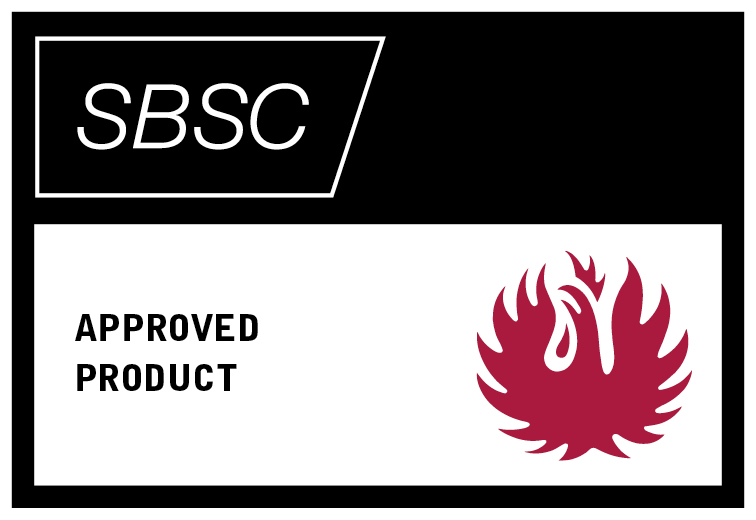Revisions and the edition of this document
The current and most recently published edition of this document is available at www.milleteknik.com.
Audit log can be requested, see contact information for address or e-mail address.
The validity of this document can not be guaranteed, as new editions are published without prior notice.
User manual in original language: Swedish.
Instructions for use, technical data and translations thereof may contain errors. It is always the responsibility of the installer to install the product in a safe manner.
Installation video
Read this first!
If possible, leave 100 mm of free space.
The system is intended for use in a controlled indoor environment.
Only authorized persons should install and maintain the system.
It is the installer's responsibility to ensure that the system is suitable for its intended use.
Documents accompanying the system must be kept in or in its immediate vicinity.
Ventilation should not be covered. Mains voltage should be disconnected during installation.
All information subject to change.
Upon installation of this product, the installer acknowledges and accepts the limitations of this product as described in this manual.
Instructions original language: Swedish.
About translation of this document
User manual and other documents are in the original language in Swedish. Other languages may be machine translated and/or not reviewed, errors may occur.
Component overviews
Component overview
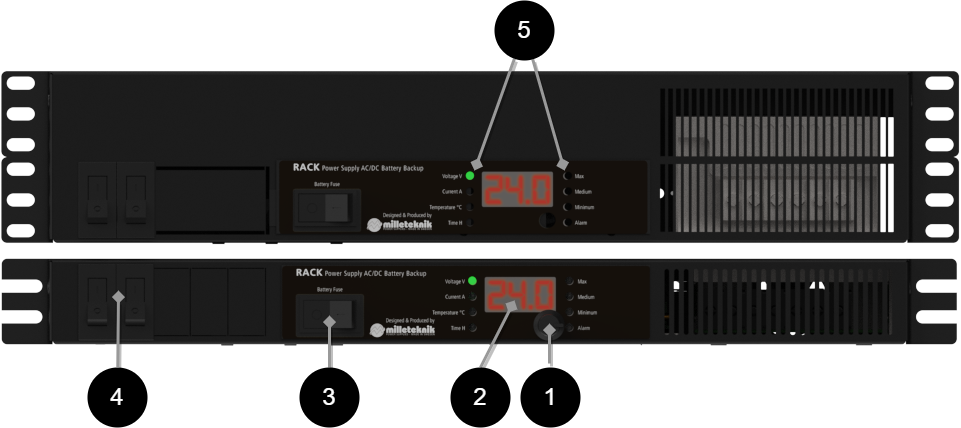
Letter | Explanation |
|---|---|
1 | Motherboard. |
2 | Lockable door. |
3 | Battery fuse |
4 | Load fuses |
5 | LED |

No . | Explanation | Comment |
|---|---|---|
1 | Connection of battery cables | - |
2 | Load output 2 | The fuse on the front is the one closest to the display. |
3 | Load output 1 | Fuse on the front is the one closest to the corner. |
4 | Temperature sensor | - |
5 | Mains connection | 230 V. |
6.1 | Relay 1 | Mains failure, NO/CO/NC. |
6.1 | Relay 2 | PSU over/under voltage, aged battery, battery not connected, broken fuse, low battery voltage in battery operation, NO/CO/NC. |
6.3 | Relay 3 | Low system voltage, NO/CO/NC. |
Enclosures
Mounting
Installation in 19" rack

No . | Explanation |
|---|---|
1 | The unit is mounted with screws into a 19" rack. |
Note
Installation of the RACK EN54-COVER can be done before or after the unit is installed.
Installation of battery shelf
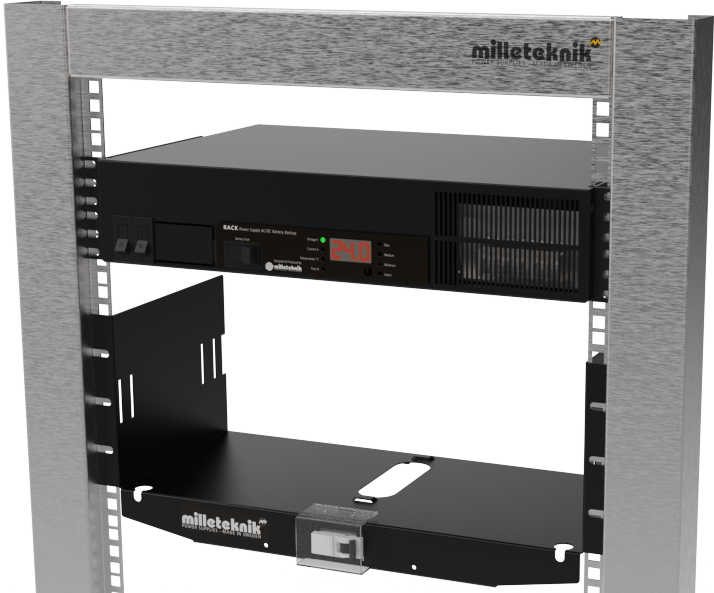
The battery shelf must be mounted in a 19" rack. Use the appropriate screw for the rack to attach the shelf.
Attach the shelf in at least two places on each side. Use as many screws as you need to keep the batteries and the shelf secure and stable.
In order for the device to function, batteries must be connected. These must be placed on a battery shelf that comes with prepared cabling. The battery shelf must be mounted in the rack before batteries are placed.
Warning
The unit must be installed in a locked and protected indoor environment.
Risk of access to battery terminals. terminal protection must cover battery poles.
Connect mains
Pull wiring through the cable entry on the cabinet.
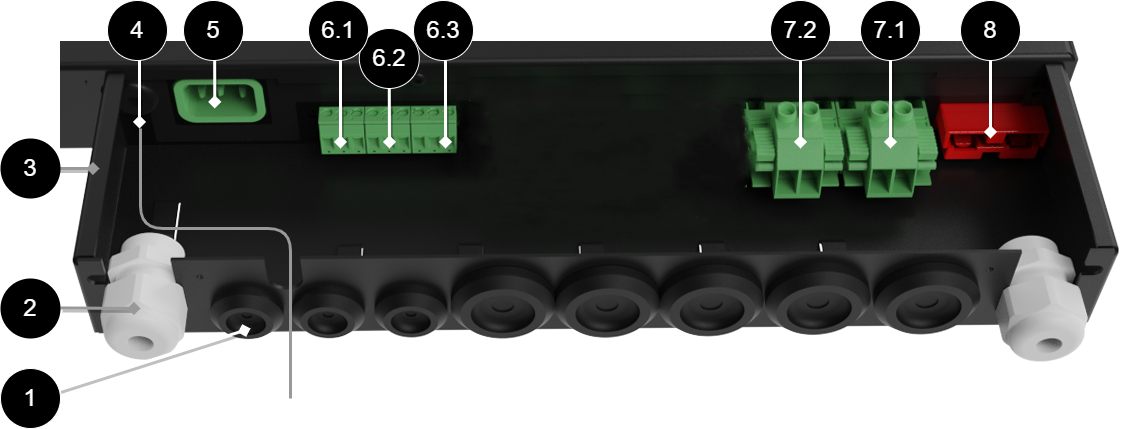
No | Explanation |
|---|---|
1 | Cable entries for alarm cables and load cables. |
2 | Strain relief for mains cable. |
3 | Shelter in powder-coated sheet metal. |
4 | Temperature sensor. |
5 | Connection for mains cable. |
6.1-6.3 | Relay 1-3, see component overview. |
7.2 | Load output 2. |
7.1 | Load output 1. |
8 | Forklift glove for connecting battery cables. |
Important
To protect the outputs on the back, a protective housing (1) in sheet metal is included. If the facility is to be EN 54-4 or SBF 110:8 approved, the protective housing must be mounted.
Connect mains 230 V AC
Connection of 230 V mains cabling to the unit takes place through the device connector on the back of the unit. Connect the power supply to the mains via easily accessible isolation switch and suitable ground fault protection (which is part of the building's existing wiring).
Temperature sensor
Temperature sensor for measuring battery temperature, place sensor between batteries.
The device has an internal temperature sensor and an external temperature sensor to measure internal and ambient temperature.
Alarm
See table 6.1-6.3
Alarm cable for battery fuse monitoring
Alarm cable for battery fuse monitoring.
Communication - optional
Connection to communication (via RS-485) can take place during customer customization.
Maximum wire resistance
The voltage at the furthest load point must not be lower than the requirements of the connected load.
Lowest voltage is given when batteries are almost discharged (21 V / 42 V) together with voltage drop in wiring. Ensure that the load can handle the lowest voltage with voltage drop in cabling.
Facts about ILAST
ILAST is the sum of the connected loads. The cable resistance (RKABEL) is the sum of the cable resistance in both conductors x the cable length.
Minimum load voltage in battery operation taking into account voltage drop in cables = VUT(MIN) - (ILAST x RKABEL). VUT(MIN) is the limit for deep discharge (21 V / 42 V) when the batteries are empty.
The table takes into account to and from conductors, i.e. the actual distance in meters must be used.
RKABEL | Ω / m |
|---|---|
1.5 mm2 | 0.024 Ω / m |
2.5 mm2 | 0.014 Ω / m |
4 mm2 | 0.009 Ω / m |
6 mm2 | 0.006 Ω / m |
10 mm2 | 0.0035 Ω / m |
16 mm2 | 0.0022 Ω / m |
Connection of batteries in battery shelf
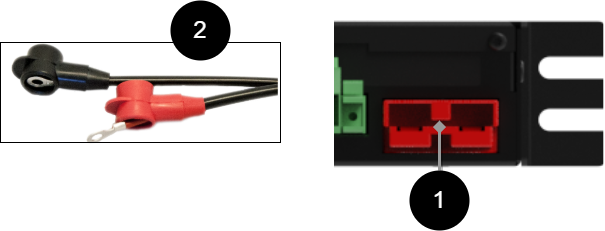
Use the included cabling to connect the batteries. Be careful not to short the terminals of the batteries. First connect wiring in batteries, (2). Cabling must have rubber pole protection that covers the battery pole. Then connect battery connector to the battery backup, (1).
Set battery capacity
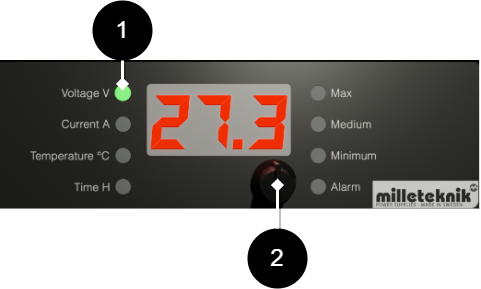
No | Explanation |
|---|---|
1 | Set the steering wheel so that V lights up green. |
2 | Press and hold the multi selector for three seconds until C00 appears on the display. Turn the multi-selection dial until C01 is displayed and press the multi-selection dial (a light push) to select the battery capacity. To accept the setting, press and hold the button for three seconds. |
Factory default setting is 2 x 20 Ah.
Turn to C00 and press the button once to return to the regular menu.
Note
The device retains settings even if power is completely cut to the device. You therefore do not need to set the battery capacity again when changing the battery.
How to start the device
After connection, start must take place in the following steps:
Connection/voltage setting of battery part.
Voltage setting to mains.
Apply voltage to the load by switching on the circuit breaker.
Commissioning
When all connections have been made, the system has been configured and the three steps for how to start the device have been completed - then the following should happen:
Status indication is off in normal operation.
The load will be powered. Check with a voltmeter that the load voltage is between 26 and 27.3 V DC (48 V, 52-54.6 V DC).
The batteries must be charged. Check this by measuring across the battery terminals. (Depending on the condition of the batteries, the voltage may vary but should be above 24 V DC, (48 V DC) and slowly increase by approximately 0.001 V/10 sec. When fully charged, the voltage of the batteries should be 27.3 V DC (48 V, 54, 6 V DC).
The ALARM indicator diode on the panel must be off.
All fault alarm relays must be in the pulled state. Check that there is a connection between CO and NC. Set the measuring instrument to continuity measurement and test termination. This should then indicate a short circuit.
All relay outputs are normally energized and thus give an alarm in de-energized mode. When connecting to communication, the parent system sends queries. The superior system must then give an alarm if, for example, the unit is de-energized.
Communication - optional
Connection to communication (via RS-485) can take place during customer customization.
List of settings via multi-selector wheel
Configuration mode on the display, accessed by a long button press on the multi-selector wheel.
(J) value is adjustable
(N) value is resettable
(U) Can perform a test/function
On display | Explanation |
|---|---|
C00 | Return to normal viewing mode. |
C01 | Setting of battery capacity in Ah (J). |
C02 | Setting the minimum allowed battery operating time (J). |
C03 | Alarm limit for low battery voltage in battery operation (J). |
C04 | Delay alarm mains failure (J). |
C05 | Low system voltage alarm (J). |
C06 | Show relay status, 100s = Power supply, 10s = Batteries 1s = Mains interruption. Tripped relay shows for power supply = 011. Tripped relay for battery shows = 101. Tripped relay for mains failure = 110. Example if all relays are set = 000. Alarm=0, energized relay=1. |
C07 | Charge Cycle (J). Duration of the charging phase, 72 hours. Full rest phase cycle is 20 days. |
C08 | Highest measured tension (N). |
C09 | Lowest measured tension (N). |
C10 | Highest measured temperature (N) - external temperature sensor. |
C11 | Lowest measured temperature (N) - external temperature sensor. |
C12 | Number of minutes with overtemperature (N). |
C13 | Number of minutes with sub-temperature (N). |
C14 | Stopwatch load current above 170% of nominal load (N). Risk of load bills triggering. |
C15 | Minute counter load current above 100% of nominal load (N). Risk that dimensioning requirements are not met. |
C16 | Day counter load current above 80% of nominal load (N). Risk that the warranty period is not reached. |
C17 | Perform battery connection test (U). |
C18 | Perform Cell Test (U). |
C19 | Perform Weekly Test (U). |
C20 | Calibrate battery voltage (J). Factory setting - May not be changed. |
C21 | Calibrate voltage from mains plug (J). Factory setting - May not be changed |
C22 | Calibrate zero current (N). Factory setting - May not be changed |
C23 | Calibrate load current (J). Factory setting - May not be changed |
C24 | Setting of nominal load (J). |
C25 | Limit value for deep discharge protection (J). ATTENTION! 1HE has hardware-controlled deep discharge. |
C26 | Limit value for weekly test (J). |
C27 | Original value for Cell test (J). |
C28 | Allowed additional voltage drop during cell test (J). |
C29 | Raw data from the A/D converter. |
C30 | Raw data from the A/D converter. |
C31 | Raw data from the A/D converter. |
C32 | Raw data from the A/D converter. |
C33 | Raw data from the A/D converter. |
C34 | Raw data from the A/D converter. |
C35 | Raw data from the A/D converter. |
C36 | Internal flags. |
C37 | Internal flags. |
C58 | Measured value from internal temperature sensor. |
C59 | Highest measured value from internal temperature sensor. |
Maintenance
The system with the exception of batteries is maintenance-free when installed in an indoor environment.
Maintenance schedule batteries
The maintenance schedule applies to batteries made by UPLUS and with the following serial names: US, USL, USF, and for batteries made by XLENT POWER with serial names XLT and XLL. For maintenance instructions see separate document "care instructions valve-regulated lead-acid battery”.
Series designation | Battery type | Replace battery after |
|---|---|---|
XLT | 3-5 years | 2-3 years |
US | 6-9 years | 3-5 years |
USL | 10-12 years | 5-7 years |
USF | 12 years | 8-10 years |
* battery life depends mainly on ambient temperature and charging current. An AGM battery should never be charged with more than 30% of its rated capacity. The battery will be fully charges, but the charning current must not excced 30% of its rated capacity. | ||
Charging voltage from power supply | 12 V units | 24 V units | 48 V units |
|---|---|---|---|
Minimum charging voltage | 13.6 V | 27.2 V | 54.4 V |
Maximum charging voltage | 13.7 V | 27.4 V | 54.8 V |
Tolerance | +/- 0.5% | +/- 0.5% | +/- 0.5% |
terminal voltage | After 15 minutes of rest / charging. |
|---|---|
Minimum terminal voltage | 12.9 V |
Maximum allowable difference between battery pairs | 0.5 V |
New battery with terminal voltage below 12.0 V is defective and should be reported to the supplier. | |
Temperature in battery backup | Temperature |
|---|---|
Lowest | 15 ° C |
Recommended | 20 ° C - 25 ° C |
Highest | 32 ° C |
Warranty is valid only if the temperature is within these levels. | |
Installation control batteries
Check that the battery is completely clean and that the terminals are free from corrosion.
Check and note the temperature in the battery compartment.
Check the terminal voltage of each battery before installation. If the difference between the batteries exceeds 0.5 V, the battery loop should be equalized in connection with installation. If any battery has a terminal voltage of less than 12V, this battery must be replaced with a new battery and reported to the supplier.
Connect the battery and check the charging voltage. The charging voltage should be between 2.25 V - 2.27 V per cell = between 13.5 V - 13.62 V for a 12 V system and between 27.0 V - 27.24 V for a 24 V system.
Year-round inspection
Check that the battery is completely clean and that the terminals are free from corrosion. If there is corrosion on the terminals: Check that the battery does not leak acid. Then clean the terminals and reconnect the battery. Then lubricate with battery terminal grease over the connected terminal.
Check and note the temperature in the battery compartment.
Check and note the average current.
Check that all connections are securely fastened and that there is no gap in the connection.
Check that the fan (if units have a fan) is working properly. Clean the fan if necessary.
Check the charging voltage by measuring with a multimeter between the connection points + & amp; -. The charging voltage should be between 2.25-2.27 volts per cell = between 13.5-13.62V for a 12V system and between 27-27.24V for a 24V system.
Turn off the rectifier and let the batteries rest for 10 - 15 minutes. Then measure the terminal voltage of each battery. After resting, the terminal voltage must be between 12.9 V - 13.5 V.
Product sheet - technical data
Technical specifications: EN54-4 Certified / SBF110:8 Approved battery backup
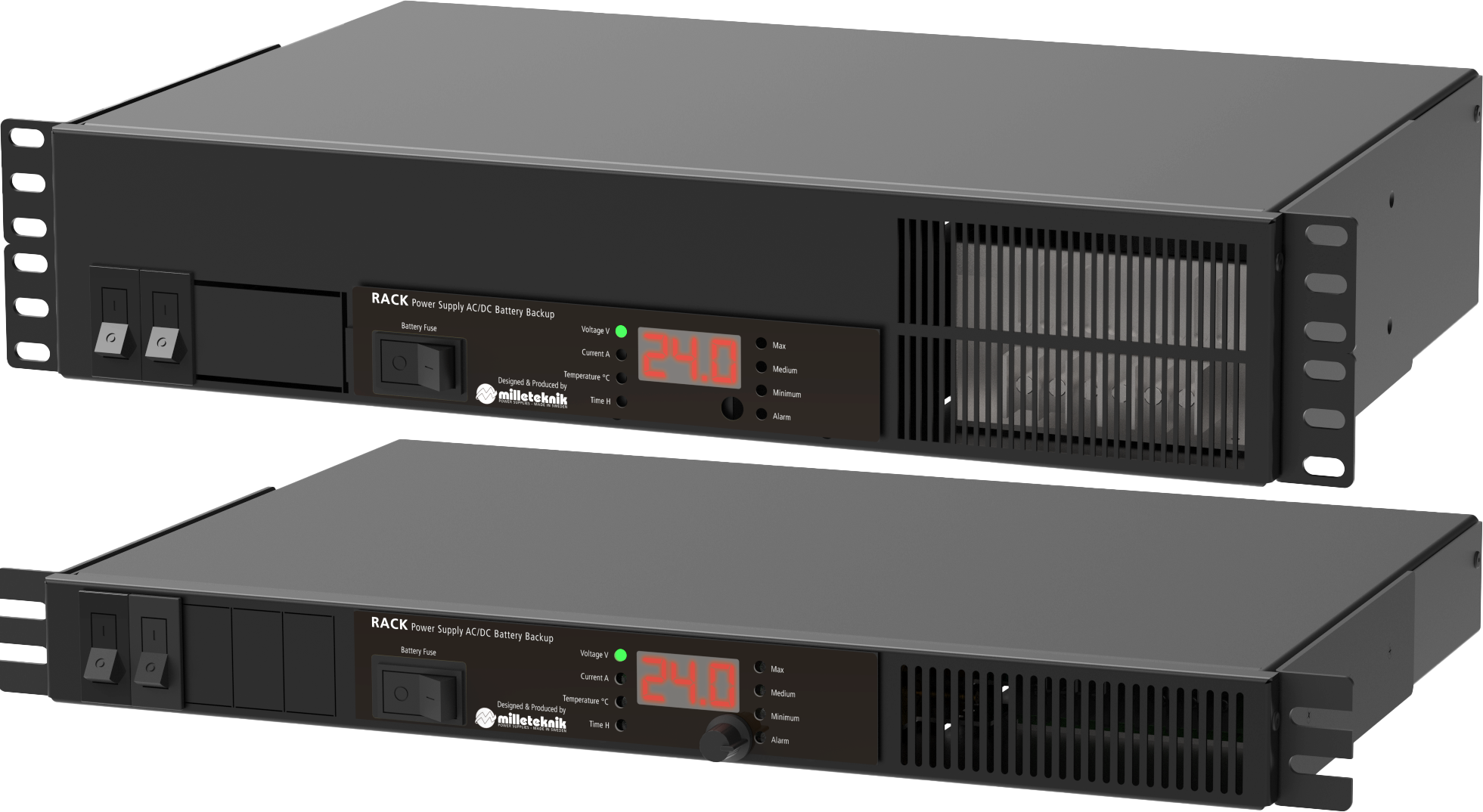
The battery backup is mounted in a 19" rack.
Name, article number, e-number and certificate number
Name | Item number | Email number | Product name on certificate | Certified according to | SBSC Certificate number | Certification scheme: |
|---|---|---|---|---|---|---|
EN54 24V 15A 1U | 1U01R10024P150-EN54 | 52 135 55 | RACK 27 150-1HE, | SBF 110:8 The product also meets SBF 110:7 | No. 18-244 | Scheme 1a (ISO/IEC 17067:2013)2017-12-18 |
EN54 24V 25A 2U | 2U01R10024P250-EN54 | 52 135 56 | RACK 27 250-2HE | SBF 110:8 The product also meets SBF 110:7 | No. 18-244 | Scheme 1a (ISO/IEC 17067:2013)2017-12-18 |
EN54 48V 7A 1U | 1U01R10048P070-EN54 | 52 135 57 | RACK 54 70-1HE | SBF 110:8 The product also meets SBF 110:7 | No. 18-244 | Scheme 1a (ISO/IEC 17067:2013)2017-12-18 |
EN54 48V 13A 2U | 2U01R10048P130-EN54 | 52 135 58 | RACK 54 130-2HE | SBF 110:8 The product also meets SBF 110:7 | No. 18-244 | Scheme 1a (ISO/IEC 17067:2013)2017-12-18 |
About EN54 1U and EN54 2U
EN54 powers fire alarms with 24 V DC – 48 V DC. The rectifier in the power supply converts 230 V DC down to 48 V or 24 V and supplies power to all important parts of the fire alarm system. Batteries continue to power the fire alarm system when the power goes down. EN54 power supply is certified to be used in security facilities that must meet EN54-4 or be approved for SBF 110:8.
Long life, energy efficient and support is available if something goes wrong, now or in 10 years.
About certification
EN54 is used for fire alarm systems in public environments such as schools, offices and commercial properties.
Fixed installation
The product is intended for fixed installation. The battery backup must be installed by a qualified installer.
Regulations and certifications
Standards that product (s) meet and are approved for
EN50131-6:2017. |
EN 54-4:1997, EN 54-4:1997/AC:1999, EN 54-4:1997/A1:2002 and EN 54-4:1997/A2:2006. |
SBF 110:8 |
SSF1014 Alarm class 1-4 (burglar alarm). |
SSF1014, Issue 5. |
Certificate number, SBSC | Designation SBSC |
|---|---|
No. 18-244 | - |
Requirements that the product meets
EMC: | EMC Directive 2014 / 30EU |
Electricity: | Low voltage directive: 2014/35 / EU |
CE: | CE directive according to: 765/2008 |
Emission: | EN61000-6-: 2001 EN55022: 1998: -A1: 2000, A2: 2003 Klass B, EN61000-3-2: 2001 |
Immunity: | SS-EN 50 130-4:2011 Edition 2, EN50131-6 |


Battery combinations 1U and 2U
Ah | Number of battery used in | combination with EN54 24V 15A 1U | combination with EN54 24V 25A 2U |
|---|---|---|---|
28 Ah | 2 pcs. 28 Ah | Yes | No |
45 Ah | 2 pcs. 45 Ah | Yes | Yes |
55 Ah | 2 pcs. 55 Ah F (front fed) | Yes | Yes |
75 Ah | 2 pcs. 75 Ah | Yes | Yes |
90 Ah | 4 pcs. 45 Ah | Yes | Yes |
100 Ah | 2 pcs. 100 Ah / 2 pcs 100 Ah F (front fed) | Yes | Yes |
110 Ah | 2 pcs. 55 Ah F (front fed) | Yes | Yes |
125 Ah | 2 pcs. 125 F (front fed) | Yes | Yes |
135 Ah | 6 pcs. 45 Ah | Yes | Yes |
150 Ah | 2 pcs. 150 F (front fed) or 4 pcs. 75 Ah | Yes | Yes |
180 Ah | 8 pcs. 45 Ah | Yes | Yes |
200 Ah | 2 pcs. 100 Ah or 2 pcs. 100 Ah F (front fed) | Yes | Yes |
240 Ah | 4 pcs. 120 Ah | No | Yes |
250 Ah | 4 pcs. 125 F (front fed) | No | Yes |
300Ah | 4 pcs. 150 F (front fed) or 6 pcs. 100 F (front fed) | No | Yes |
Ah | Number of battery used in | combination with EN54 48V 7A 1U | combination with EN54 48V 13A 2U |
|---|---|---|---|
20 Ah | 4 pcs. 20 Ah | Yes | Yes |
28 Ah | 4 pcs. 28 Ah | Yes | Yes |
45 Ah | 4 pcs. 45 Ah | Yes | Yes |
55 Ah | 4 pcs. 55 Ah F (front fed) | Yes | Yes |
75 Ah | 4 pcs. 75 Ah | Yes | Yes |
90 Ah | 4 pcs. 45 Ah | Yes | Yes |
100 Ah | 4 pcs. 100 Ah F (front fed) | Yes | Yes |
110 Ah | 8 pcs. 55 Ah F (front fed) | No | Yes |
120 Ah | 4 pcs. 120 Ah | No | Yes |
125 Ah | 4 pcs. 125 Ah F (front fed) | No | Yes |
150 Ah | 4 pcs. 150 Ah F (front fed) | No | Yes |
200 Ah | 8 pcs. 100 Ah F (front fed) | No | Yes |
Reserve operating times, power outlet and load output current
Cargo current
Battery size | Maximum Power outlet i network operation (Imax. A) |
|---|---|
28 Ah | 12 A |
45 Ah | 11 A |
55 Ah | 10.3 A |
75 Ah | 9.1 A |
90 Ah | 8.2 A |
100 Ah | 7.5 A |
110 Ah | 6.9 A |
120 Ah | 6.3 A |
125 Ah | 6 A |
135 Ah | 5.3 A |
150 Ah | 4.3 A |
180 Ah | 2.5 A |
200 Ah | 1.3 A |
Maximum power consumption battery operation: 14 A | |
Maximum current consumption battery operation, (same as Imax.b): 15 A | |
Battery size | Maximum Power outlet i network operation (Imax. A) |
|---|---|
45 Ah | 24 A |
55 Ah | 23.3 A |
75 Ah | 22.1 A |
90 Ah | 21.2 A |
100 Ah | 20.5 A |
110 Ah | 19.9 A |
120 Ah | 19.3 A |
125 Ah | 19 a |
135 Ah | 18.3 A |
150 Ah | 17.4 A |
180 Ah | 15.5 A |
200 Ah | 14.3 A |
240 Ah | 11.8 A |
250 Ah | 11.2 A |
300 Ah | 8 A |
Maximum power consumption battery operation: 14 A | |
Maximum current consumption battery operation, (same as Imax.b): 15 A | |
Battery size | Maximum Power outlet i network operation (Imax. A) |
|---|---|
14 Ah | 6 A |
20 Ah | 5.6 A |
90 Ah | 5.1 A |
100 Ah | 4.1 A |
120/125 Ah | 3.4 A |
135 Ah | 2.2 A |
150 Ah | 1.3 A |
180 Ah | 0.65 A |
Maximum current consumption battery operation: 14 A | |
Maximum current consumption battery operation, (same as Imax.b): 15 A | |
Battery size | Maximum Power outlet i network operation (Imax. A) |
|---|---|
20 Ah | 11.6 A |
28 Ah | 11.1 A |
45 Ah | 10.1 A |
55 Ah | 9.4 A |
75 Ah | 8.2 A |
90 Ah | 7.3 A |
100 Ah | 6.6 A |
110 Ah | 6 A |
120 Ah | 5.4 A |
125 Ah | 5.1 A |
150 Ah | 3.5 A |
200 Ah | 0.4 A |
Maximum power consumption battery operation: 14 A | |
Maximum current consumption battery operation, (same as Imax.b): 15 A | |
Reserve operating times for different alarm classes - overview
Alarm class | Spare operating time in the event of a power failure | Maximum number of hours of battery recharging (80%) |
|---|---|---|
EN54-4 | - | 24 h |
SBF110: 8 | 30 h + 10 min | 24 h |
EN50131-6 grades 1-2 | 12 h | 72 h |
EN50131-6 grade 3 | 24 h | 24 h |
SSF1014 Alarm class 1/2 | 12 h | 72 h |
SSF1014 Alarm class 3/4 | 30 h | 24 h |
The table shows the requirements for backup operating time and recharging of batteries for different alarm classes.
Internal resistance 1U and 2U
24 V two pairs of power resistors each parallel 3.3 Ω
48 V two pairs of power resistors each parallel 15 Ω
Circuit boards - Technical data
Technical data - 1HE (motherboard)
Info | Explanation |
|---|---|
Article title | 1HE |
Description | Circuit board for control, distribution, status and alarm from the device. |
Status indication | LED, display and communication output (RS-485). |
Communication protocol | RS-485 Milleprotokollet - Optional |
Error output | Potential-free relay switches rated 1 A @ 30 V DC (all fault outputs). |
Self consumption, (in battery operation) | 24 V units: 270 mA. 48 V units: 200 mA |
Switching time | Batteries rest for 20-day cycles, after which a charging cycle picks up and charges the batteries for 72 hours. If there is a power failure when the batteries are in the charging cycle, there is no switching time. |
Deep discharge | Deep discharge protection is activated: 1U / 24 V and 2U / 24 V systems when the power supply voltage is below 19 V DC. (1 U / 48 V and 2 U / 48 V systems when the power supply voltage is below 38 V DC.) |
Tension, ripple | less than 210 mVp-p in normal operation. (Max 2 V in ripple voltage when recharging batteries, when the power supply goes within the current limit). |
Name | Alarm |
|---|---|
Power Outage / Mains Alarm | NO / CO / NC |
Fault in power supply and Fuse Error / PSU and Fuse Error | NO / CO / NC |
Battery Error, Aged Battery | NO / CO / NC |
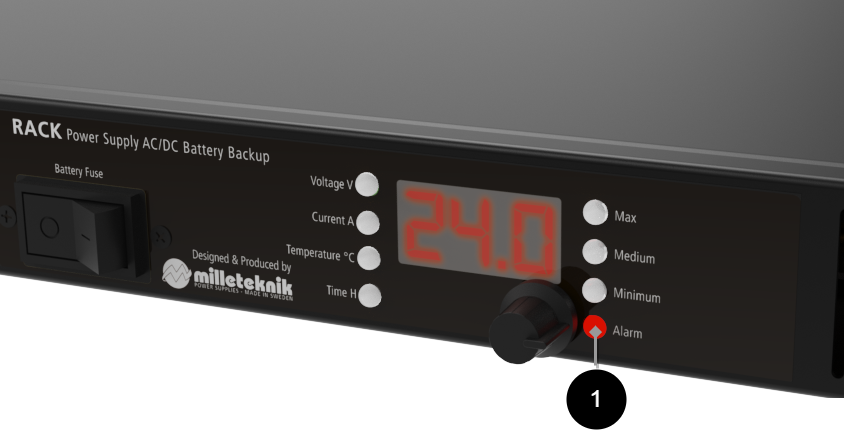
LED status (1) | Explanation | Comment |
|---|---|---|
Off | Normal operation | - |
1 blink | Network outages | - |
2 flashes | Delayed network failure | 10 second delay. |
3 flashes | Charger error | If the batteries have not reached the desired voltage (26.7V) after completing the charging cycle. If the power supply drops below the limit value (26.5V) during the current dormant phase for the batteries. If the voltage from the power supply drops during the connection test for the batteries that occurs every 10 seconds. At low voltage in the power supply (26.7V), the batteries are disconnected every 10 minutes, if low voltage in the power supply remains an alarm is given. If the mains voltage is below system voltage (24V) during mains operation, an alarm is given. |
4 flashes | Surge power supply | Voltage above 27.9 V DC (24 V), / 55.8 V DC (48 V). |
5 blink | Battery fault | Aged batteries, failed weekly test. Cell test, the internal resistance of the battery has risen above the limit value. Failed connection test. Batteries are not connected or battery voltage below 16 V. |
6 flashes | Low battery voltage | Low battery voltage in battery operation. |
7 flashes | Summarmarm | Temperature alarm, the temperature is below or above the limit value. Fuse failure, load or battery fuse has blown. Fuse fault from external card with load outputs. Ground fault (D-Sub). Signal error (D-Sub). The temperature sensor is incorrect or missing. Fan fault. |
8 blink | System error | The system is not calibrated. |
EN54 24V 15A 1U | EN54 24V 25A 2U | EN54 48V 7A 1U | EN54 48V 13A 2U | |
|---|---|---|---|---|
Load securing 1 (sits furthest towards the edge) | 10 A | 10 A | 10 A | 10 A |
Load securing 2 | 10 A | 20 A | 20 A | 20 A |
Load securing is installed at the factory and can not be retrofitted. | ||||
What is shown on the display - 1HE

By default, the power supply has a front display for status information. The multi-selector dial allows you to read the value on the display. By turning the knob and clicking, the status to be read is selected.
LED that lights up | Display shows | Explanation |
|---|---|---|
Voltage / Voltage (V) | Shows current voltage | - |
Voltage / Voltage (V) + Max | Displays the maximum value for voltage | |
Voltage / Voltage (V) + Medium | Displays average voltage | |
Voltage / Voltage (V) + Minimum | Displays min value for voltage | |
Current (A) / Current (A) | Displays current | |
Current (A) / Current (A) + Max | Displays the maximum value for current | |
Current (A) / Current (A) + Medium | Displays average value for current | |
Current (A) / Current (A) - Minimum | Displays min-value for current | |
Temp (° C) | Displays the current temperature in the system | Temperature, shows the line temperature sensor is not connected |
Temp (° C) + Max | Displays maximum value for temperature | Displays value from internal or external temperature sensor. |
Temp (° C) - Medium | Displays average temperature | Displays value from internal or external temperature sensor. |
Temp (° C) - Minimum | Displays min-value for temperature | Displays value from internal or external temperature sensor. |
Time (H) | Displays current operating time in hours | |
Time (H) + Min | Shows the shortest measured operating time |
Power supply
Power supply - Technical Data HRP-300-24
In: |
|---|
EN54 24V 15A 1U |
Info | Explanation |
|---|---|
Output voltage | 27.3 V |
Output current | 0 A - 14 A |
Output voltage, ripple | 150 mVp-p |
Overvoltage | 30 V - 34.8 V |
Voltage recharge, ripple / current limitation | Less than 1.2 Vp-p |
Efficiency | 87% |
Current limitation | 105% - 135% |
Constant voltage | +/- 0.5% |
Regulatory accuracy | +/- 1.0% |
Input current (230 V) | 1,8 A |
Mains voltage frequency | 47 Hz- 63 Hz |
Mains voltage | 230 V AC - 240 V AC |
Brand effect | 336 W |
Temperature range | -40 ° C - + 70 ° C |
Humidity range | 20% - 90% RH non-condensed |
Power supply - Technical Data HRP-600-24
In: |
|---|
EN54 24V 25A 2U |
Info | Explanation |
|---|---|
Output voltage | 27.3 V |
Output current | 0 A - 27 A |
Output voltage, ripple | 150 mVp-p |
Overvoltage | 30 V - 34.8 V |
Voltage recharge, ripple / current limitation | Less than 1.2 Vp-p |
Efficiency | 88% |
Current limitation | 105% - 135% |
Constant voltage | +/- 0.5% |
Regulatory accuracy | +/- 1.0% |
Input current (230 V) | 3,6 A |
Mains voltage frequency | 47 Hz- 63 Hz |
Mains voltage | 230 V AC - 240 V AC |
Brand effect | 648 W |
Temperature range | -30°C - +70°C |
Humidity range | 20% - 90% RH non-condensed |
Power supply - Technical Data HRP-300-24
In: |
|---|
EN54 24V 7A 1U |
Info | Explanation |
|---|---|
Output voltage | 27.3 V |
Output current | 0 A - 14 A |
Output voltage, ripple | 150 mVp-p |
Overvoltage | 30 V - 34.8 V |
Voltage recharge, ripple / current limitation | Less than 1.2 Vp-p |
Efficiency | 87% |
Current limitation | 105% - 135% |
Constant voltage | +/- 0.5% |
Regulatory accuracy | +/- 1.0% |
Input current (230 V) | 1,8 A |
Mains voltage frequency | 47 Hz- 63 Hz |
Mains voltage | 230 V AC - 240 V AC |
Brand effect | 336 W |
Temperature range | -40 ° C - + 70 ° C |
Humidity range | 20% - 90% RH non-condensed |
Power supply - Technical Data HRP-600-24
In: |
|---|
EN54 48V 13A 2U |
Info | Explanation |
|---|---|
Output voltage | 27.3 V |
Output current | 0 A - 27 A |
Output voltage, ripple | 150 mVp-p |
Overvoltage | 30 V - 34.8 V |
Voltage recharge, ripple / current limitation | Less than 1.2 Vp-p |
Efficiency | 88% |
Current limitation | 105% - 135% |
Constant voltage | +/- 0.5% |
Regulatory accuracy | +/- 1.0% |
Input current (230 V) | 3,6 A |
Mains voltage frequency | 47 Hz- 63 Hz |
Mains voltage | 230 V AC - 240 V AC |
Brand effect | 648 W |
Temperature range | -30°C - +70°C |
Humidity range | 20% - 90% RH non-condensed |
Technical data enclosures
Technical data 1U
Info | Explanation |
|---|---|
Name | 1U |
Enclosure class | IP 20 |
Measure | Height: 44 mm, width: 244 mm, depth: 280 mm. |
Height units | 1 |
Mounting | 19 "rack |
Ambient temperature | + 5 ° C - + 40 ° C. For best battery life: + 15 ° C to + 25 ° C. |
Environment | Environmental class 1, indoors. 20% ~ 90% relative humidity |
Material | Powder coated sheet metal |
Color | Black |
Cable glands, number | 8 |
Technical data 2U
Info | Explanation |
|---|---|
Name | 1U |
Enclosure class | IP 20 |
Measure | Height: 88 mm, width: 244 mm, depth: 280 mm. |
Height units | 2 |
Mounting | 19 "rack |
Ambient temperature | + 5 ° C - + 40 ° C. For best battery life: + 15 ° C to + 25 ° C. |
Environment | Environmental class 1, indoors. 20% ~ 90% relative humidity |
Material | Powder coated sheet metal |
Color | Black |
Cable glands, number | 8 |
Link to the latest information
Products and software are subject to updates, you will always find the latest information on our website.
Warranty, support, country of manufacture and country of origin
Warranty 5 years
The product has a five-year warranty, from the date of purchase (unless otherwise agreed). Free support during the warranty period is reached at support@milleteknik.se or telephone, +46 31-34 00 230. Compensation for travel and or working hours in connection with the location of faults, installation of repaired or replaced goods is not included in the warranty. Contact Milleteknik for more information. Milleteknik provides support during the product's lifetime, however, no later than 10 years after the date of purchase. Switching to an equivalent product may occur if Milleteknik deems that repair is not possible. Support may be added (at Millteknik's desrection) after the warranty period has expired.
Manufacturer support
Manufacturers provide support for the life of the product, however, for a maximum of 10 years after the date of purchase. Switching to an equivalent product may occur if the manufacturer deems that repair is not possible. Support costs will be added after the warranty period has expired.
Support
Do you need help with installation or connection?
You will find answers to many questions at: www.milleteknik.se/support
Phone: +46 31-340 02 30
Support is open: Monday-Thursday 08:00-16:00, Fridays 08:00-15:00. Closed 11:30-13:15.
Spare parts
Contacted support for questions about spare parts.
Support after the warranty period
Milleteknik provides support during the life of the product, but no longer than 10 years after the date of purchase. Replacement for an equivalent product may occur if the manufacturer deems that repair is not possible. Costs for support and replacement are added after the warranty period has expired.
Questions about product performance?
Contact sales: 46 31-340 02 30, e-mail: sales@milleteknik.se
Contact us
Milleteknik AB
Ögärdesvägen 8 B
S-433 30 Partille
Sweden
+46 31-34 00 230
www.milleteknik.se
Country of manufacture
Country of manufacture / country of origin is Sweden. For more information, contact your seller.
Designed and produced by: Milleteknik AB
Designed and produced by Milleteknik AB
Batteries - recommended, not included
Batteries are not included they are sold separately
Batteries are sold separately.
Certified with battery type
The device is certified with a UPLUS battery that must be used to maintain the certificate.
20 Ah, 12 V AGM battery
Fits in | Number of batteries |
|---|
Battery type | V | Ah |
|---|---|---|
Maintenance-free AGM, lead-acid battery. | 12 V | 20 Ah |
Article number | E-number | Article name | Terminal | Measure. Height width depth | Weight per piece | Make |
|---|---|---|---|---|---|---|
MT113-12V20-01 | 5230538 | UPLUS 12V 20Ah 10+ Design Life battery | M5 Bult | 182x77x168 mm | 6.0 kg | UPLUS |
28 Ah, 12 V AGM battery
Battery type | V | Ah |
|---|---|---|
Maintenance-free AGM, lead-acid battery. | 12 V | 28 Ah |
Article number | E-number | Article name | Terminal | Measure. Height width depth | Weight per piece | Make |
|---|---|---|---|---|---|---|
MT113-12V28-01 | 5230545 | UPLUS 12V 28Ah 10+ Design Life battery | M5 Bult | 165x125x175 mm | 9.5 kg | UPLUS |
45 Ah, 12 V AGM battery
Fits in | Number of batteries |
|---|
Battery type | V | Ah |
|---|---|---|
Maintenance-free AGM, lead-acid battery. | 12 V | 45 Ah |
Article number | E-number | Article name | Terminal | Measure. Height width depth | Weight per piece | Make |
|---|---|---|---|---|---|---|
MT113-12V45-01 | 5230546 | UPLUS 12V 45Ah 10+ Design Life battery | M5 Bult | 197x165x170 mm | 14.5 kg | UPLUS |
75 Ah, 12 V AGM battery
Battery type | V | Ah |
|---|---|---|
Maintenance-free AGM, lead-acid battery. | 12 V | 75 Ah |
Article number | E-number | Article name | Terminal | Measure. Height width depth | Weight per piece | Make |
|---|---|---|---|---|---|---|
MT113-12V75-01 *** | 5230547 | UPLUS 12V 75Ah 10+ Design Life battery | M6 Bult | 295x168x214 mm | 21 kg | UPLUS |
100 Ah, 12 V AGM battery
Battery type | V | Ah |
|---|---|---|
Maintenance-free AGM, lead-acid battery. | 12 V | 100 Ah |
Article number | E-number | Article name | Terminal | Measure. Height width depth | Weight per piece | Make |
|---|---|---|---|---|---|---|
MT113-12V100-01 *** | 5230549 | UPLUS 12V 100Ah 10+ Design Life battery | M8 Bult | 330x173x212 mm | 30 kg | UPLUS |
55 Ah, 12 V AGM battery
Battery type | V | Ah |
|---|---|---|
Maintenance-free AGM, lead-acid battery. | 12 V | 55 Ah |
Article number | E-number | Article name | Terminal | Measure. Height width depth | Weight per piece | Make |
|---|---|---|---|---|---|---|
MT114-12V55-FT *** | 5230562 | UPLUS 12V 55Ah 12+ Design Life battery | M6 Bult | 277x106x222 mm | 18 kg | UPLUS |
100 Ah, 12 V AGM battery
Battery type | V | Ah |
|---|---|---|
Maintenance-free AGM, lead-acid battery. | 12 V | 100 Ah |
Article number | E-number | Article name | Terminal | Measure. Height width depth | Weight per piece | Make |
|---|---|---|---|---|---|---|
MT114-12V100-FT *** | 5230563 | UPLUS 12V 100Ah 12+ Design Life battery | M6 Bult | 285x110x394 mm | 35.6 kg | UPLUS |
MT114-12V125-FT *
Battery type | V | Ah |
|---|---|---|
Maintenance-free AGM, lead-acid battery. | 12 V | 125 Ah |
Article number | E-number | Article name | Terminal | Measure. Height width depth | Weight per piece | Make |
|---|---|---|---|---|---|---|
MT114-12V125-FT *** | 5230564 | UPLUS 12V 125Ah 12+ Design Life battery | M6 Bult | 287x110x551 mm | 40.5 kg | UPLUS |
150 Ah, 12 V AGM battery
Battery type | V | Ah |
|---|---|---|
Maintenance-free AGM, lead-acid battery. | 12 V | 150 Ah |
Article number | E-number | Article name | Terminal | Measure. Height width depth | Weight per piece | Make |
|---|---|---|---|---|---|---|
MT114-12V150-FT *** | 5230565 | UPLUS 12V 150Ah 12+ Design Life battery | M6 Bult | 287x110x551 mm | 46.0 kg | UPLUS |
Reserve operating times for different alarm classes - overview
The table shows the requirements for backup operating time and recharging of batteries for different alarm classes.
Important
This is a guide and all times are approximate and may differ from actual times. Load, temperature and other factors come into play, which is why exact time can not be provided.
Applies to new batteries.
Amperage and batteries vary with configuration, check if the configuration can handle batteries and amperage.
Medium current | 28 Ah | 42 Ah | 65 Ah | 70 Ah |
|---|---|---|---|---|
- | 4 batteries (14 Ah) | 6 batteries (14 Ah) | 4 batteries (20Ah + 45 Ah) | 10 batteries (7 Ah) |
Loading | Backup operating time (approx.), Minutes | |||
0.5 A | 1650 | 2090 | 5574 | 3440 |
1 A | 970 | 865 | 3252 | 2118 |
2 A | 560 | 815 | 1770 | 1329 |
4 A | 335 | 490 | 930 | 864 |
6 A | 245 | 360 | 600 | 605 |
8 A | 210 | 310 | 426 | 544 |
10 A | 160 | 240 | 342 | 414 |
12 A | 140 | 210 | 270 | 363 |
14 A | 120 | 180 | 234 | 311 |
16 A | 100 | 150 | 204 | 286 |
18 A | 90 | 130 | 150 | 254 |
20 A | 84 | 126 | 138 | 241 |
Medium current | 90 Ah | 110 Ah | 135 Ah | 155 Ah |
|---|---|---|---|---|
- | 4 batteries (45 Ah) | 6 batteries (20 Ah + 45 Ah) | 6 batteries (45 Ah) | 8 batteries (20 Ah + 45 Ah) |
Loading | Backup operating time (approx.), Minutes | |||
0.5 A | 4705 | 5796 | 7056 | 8215 |
1 A | 2928 | 3582 | 4392 | 5070 |
2 A | 1836 | 2247 | 2754 | 3230 |
4 A | 1183 | 1438 | 1762 | 2018 |
6 A | 788 | 959 | 1175 | 1345 |
8 A | 748 | 861 | 1048 | 1150 |
10 A | 570 | 689 | 839 | 920 |
12 A | 499 | 603 | 699 | 765 |
14 A | 427 | 516 | 629 | 655 |
16 A | 404 | 499 | 592 | 590 |
18 A | 359 | 444 | 526 | 520 |
20 A | 340 | 420 | 498 | 495 |
Subject to typos.
Appendix: Mount EN-54 Cover
EN54-COVER for rack-mounted EN54 is mandatory for installation in facilities that are EN 54-4 or SBF 110:8 approved.
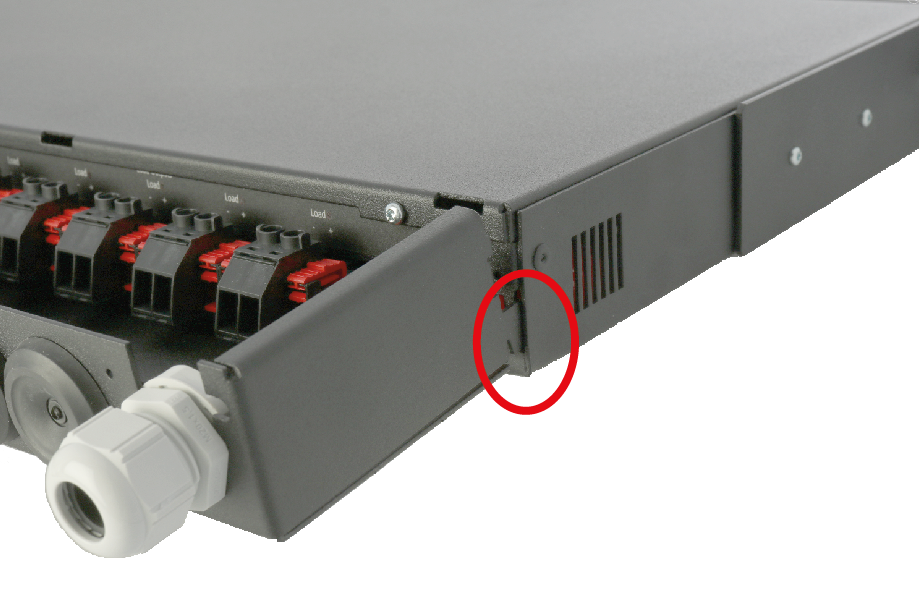
1. Slide the hooks into the RACK EN54 COVER on the back of the unit.
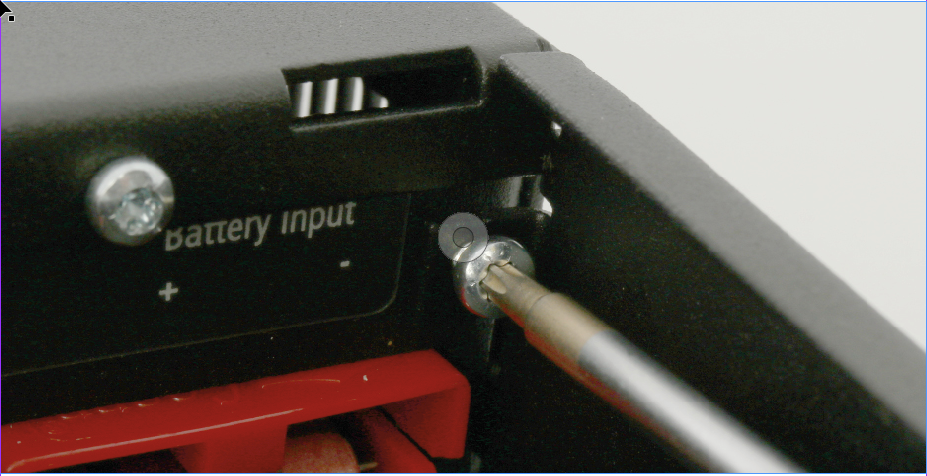
2. Screw on the EN54-COVER, (2 screws).
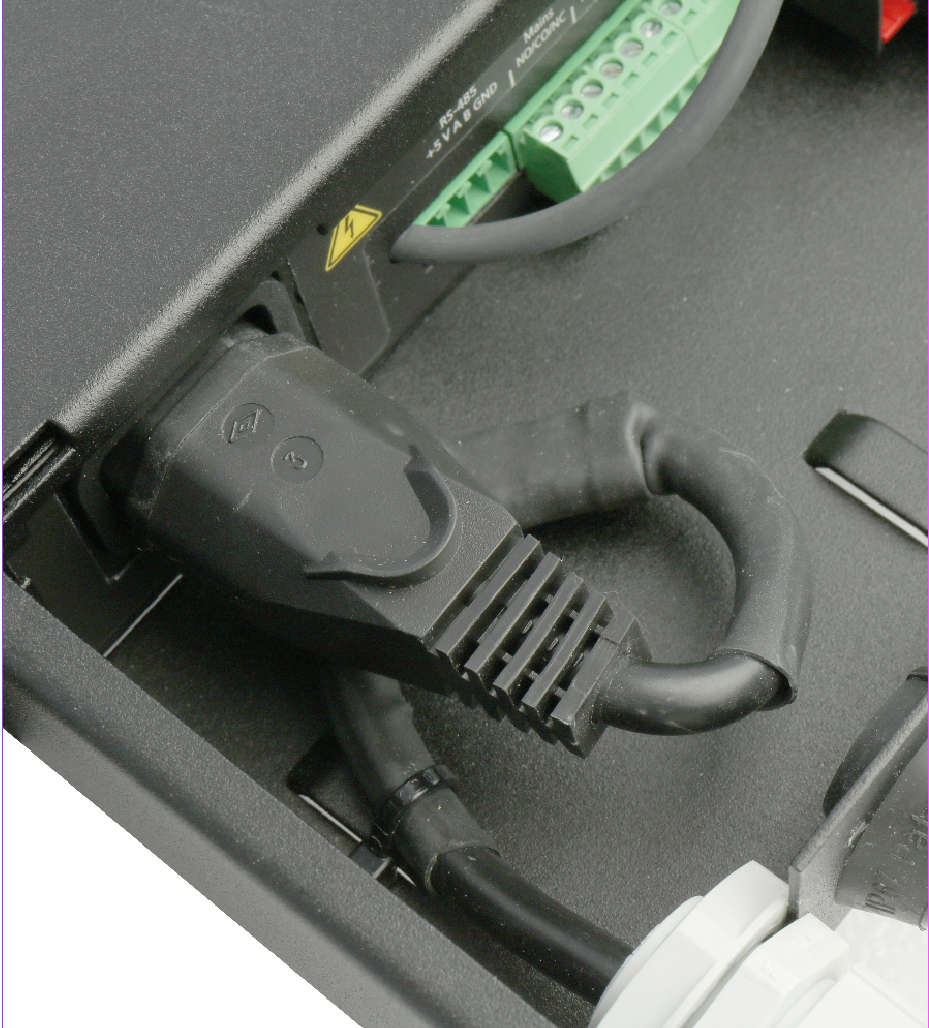
Connect other cabling before connecting to the mains. Note: The mains cable must be positioned as in the picture. The temperature sensor's protective sleeve may need to be removed to get the temperature sensor through the cable entry.
Important
All connecting cables must go through the cable glands.

4. Push the hooks into the RACK EN54-COVER cover on the back of the RACK unit.
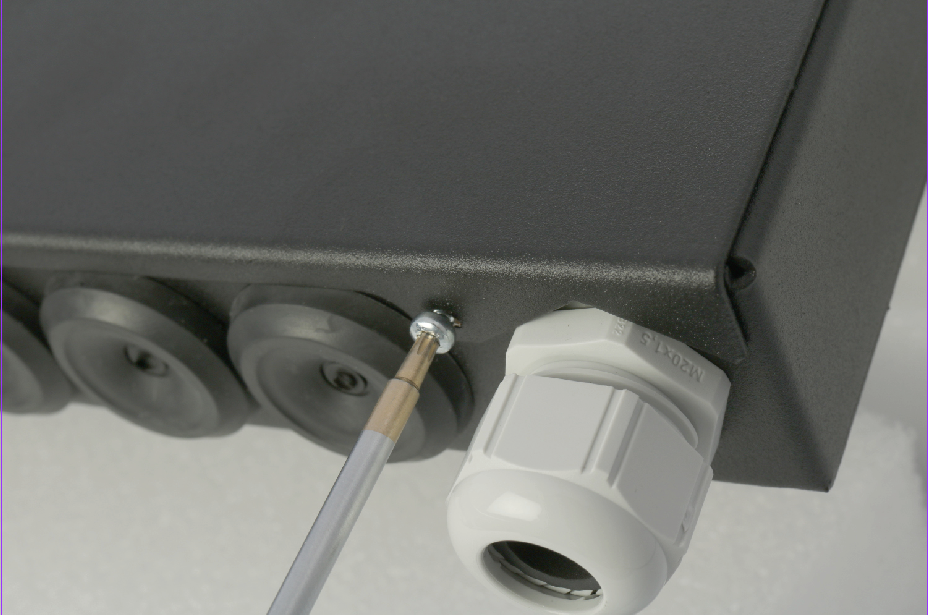
5. Screw on the cover, (2 screws).


